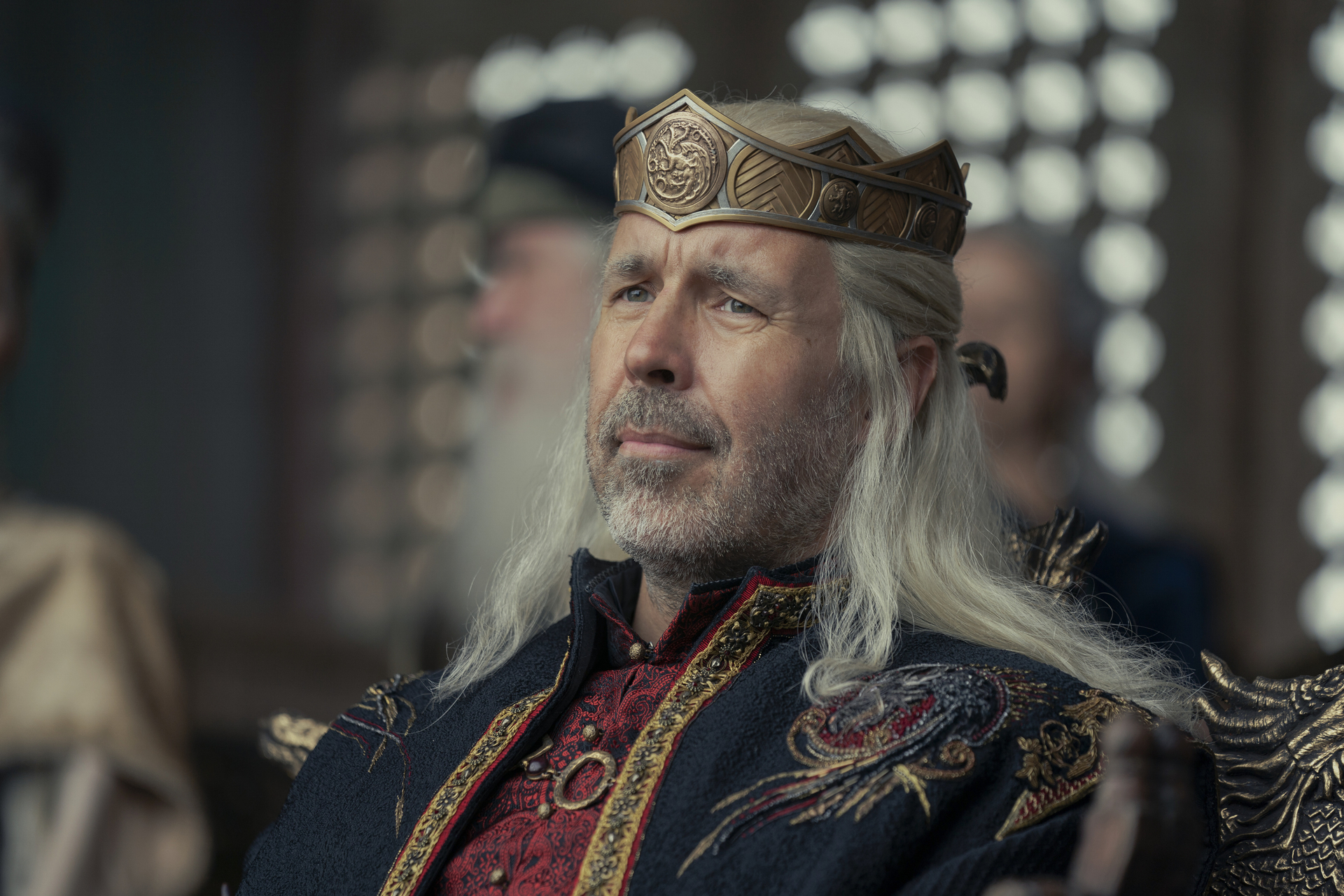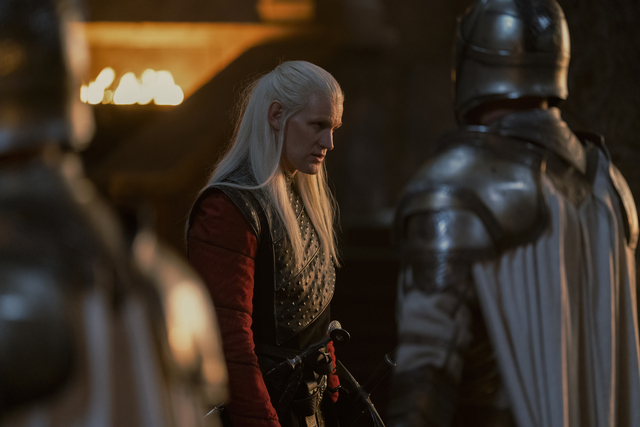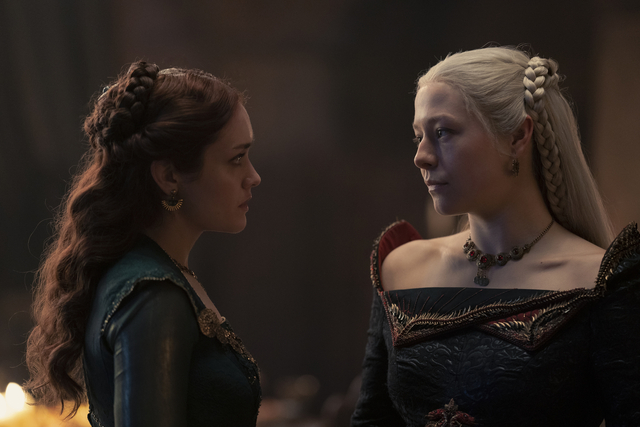“You can’t follow Thrones, it’s The Beatles.” So said Ryan Condal, who created the Game of Thrones prequel series House of the Dragon with George R. R. Martin, in a breathless Hollywood Reporter cover story on the making of Dragon. Had the Beatles spent two years and record-breaking sums of money recording an abysmal follow-up to Let It Be that would throw the band’s entire legacy into question, this might’ve been an apt comparison. In truth, Martin, Condal, and Condal’s fellow showrunner Miguel Sapochnik have taken on the tougher task of constructing a franchise out of a once-great series whose final season alienated many fans to the extent that, even in our IP-crazy times, few seemed to come out of it clamoring for more.
Read More: Your Ultimate Guide to Binge-Watching Every Game of Thrones Episode
Amid so much external pressure, it’s legitimately impressive that they managed to put together a pretty decent show. Nothing about the first several episodes of House of the Dragon, premiering Aug. 21 on HBO, marks it as a potential masterpiece. There are structural flaws, elements that come across as excessively derivative, a yawning void where thematic resonance should be. But it’s solid enough to entertain Thrones viewers who preferred that show’s focused, dialogue-rich early seasons to the bloated, combat-packed spectacle it devolved into later.
Although there’s plenty of sex, blood, and dragon riding to overwhelm the senses, the prequel is, at its core (at least in the six episodes provided for review), a family drama. Set precisely 172 years before the birth of Daenerys Targaryen, Thrones’ Mother of Dragons turned destroyer of worlds, it parallels parts of Martin’s novel Fire & Blood, chronicling the civil war that tore apart the reigning House Targaryen after decades of peace and prosperity in Westeros. The conflict is, as usual, about succession. As King Viserys Targaryen (a movingly vulnerable Paddy Considine) ages without producing a male heir, the pressure is on to name a successor, and competition heats up among other family members with ambitions trained on the Iron Throne.

In one corner, we have the show’s mostly lovable protagonist: Viserys’ 15-year-old daughter, Princess Rhaenyra (played by Milly Alcock as a teenager and Emma D’Arcy as an adult). A dragonrider with fierce, Daenerys-meets-Arya energy, Rhaenyra dreads the prospect of a future tethered to the domestic sphere by a husband and children. She clearly has the intelligence and courage to lead, and her father knows it. But he also knows that designating even the most competent woman as his heir would create unrest in Westeros and beyond, endangering House Targaryen’s reign. “Men would sooner put the realm to the torch than see a woman on the Iron Throne,” Viserys’ cousin Princess Rhaenys (Eve Best) warns. She should know; a generation ago, Rhaenys was passed over for the crown. Rhaenyra believes she’s different.
Read More: The Definitive Guide to the Game of Thrones Family Tree
For one thing, it’s not like the other option is so compelling to the king. First glimpsed astride the Iron Throne, as though it already belongs to him, Viserys’ brother Daemon (Matt Smith, looking a bit like the Witcher) lives up to his none-too-subtle name. A sort of Targaryen Roger Clinton, he’s been entrusted with leading the King’s Landing City Watch after mishandling a series of other court positions, and takes advantage of the post by sending his men on rampages of murder and mayhem intended to strike fear into the local peasants. He lies, he cheats, he resents Viserys for marrying him off to an apparently quite ugly woman he calls “the Bronze Bitch” and frequents houses of ill repute (of course there’s a brothel scene in the premiere). Yet Daemon is not another Joffrey Baratheon; he’s more wounded than outright psychopathic.

While they’re rivals, Rhaenyra and Daemon are not exactly enemies. The tension between them—including sexual tension, because child brides are a time-honored Westeros tradition and there is no such thing as an incest taboo in House Targaryen—yields some of the show’s most compelling human drama. Also sharp, as written and as acted, is the interplay between the timid king and his bold daughter. Their relationship grows more complex when a newly widowed Viserys remarries Rhaenyra’s best friend Alicent Hightower (Emily Carey, then Olivia Cooke), who is also the daughter of his self-interested Hand, Otto Hightower (Rhys Ifans). Rhaenyra feels betrayed by Alicent as well. They had dreamed of living wild, unencumbered lives together. Instead, Alicent embraces her new position in the same old order Rhaenyra hopes to upend.
Each of these relationships is fleshed out with care, and tested through solidly constructed story lines. What doesn’t get quite enough attention in early episodes is the mutual resentment between Rhaenys, known to posterity as “the queen that never was,” and Rhaenyra, the girl who would be queen. Although we see plenty of Rhaenys’ husband, Lord Corlys Velaryon (Steve Toussaint), a flourishing trader nicknamed the Sea Snake and Lord of the Tides, pushing his own seafarer’s agenda on the king’s council, Rhaenys barely gets to register her bitterness.

In relegating her to the background, Dragon misses an opportunity to develop what is supposed to be its core theme: the patriarchy’s self-destructive hostility to female leadership. To approach the nuanced political commentary Thrones achieved in its first few seasons, Condal and Sapochnik need to give us more than just the medieval-fantasy equivalent of “but her emails!” Instead, frequent images of female suffering and death just reiterate the same broad, pseudo-feminist messaging about gender that Thrones creators D.B. Weiss and David Benioff kept hammering home: sucks to be a woman, am I right? (It shouldn’t be lost on us that Dragon’s all-male creative triumvirate got to make its spinoff after HBO shelved the $30-35 million pilot for Bloodmoon, a prequel series from Kingsman screenwriter Jane Goldman.)
Read More: Every Character Who Has Died on Game of Thrones
Dragon plays it safe. From the succession premise to a horror subplot unfolding at the fringes of civilization to Thrones and Westworld composer Ramin Djawadi’s elegant score, the show sometimes seems excessively preoccupied with hitting all of its predecessor’s marks. It could look better, too. Sapochnik directed some of Thrones’ most elaborate battle episodes—he won an Emmy for season 6’s “Battle of the Bastards”—and he’s done an impressive job of replicating its visual style; if you missed all those sweeping shots of carriages gliding past palace gates, rejoice. But his keen eye can’t prevent many of the scenes that incorporate CGI from appearing slightly shoddy and cartoonish, despite the $20 million price tag per episode.

These are all minor problems compared with the show’s awkward pacing. Dragon speeds through something like 14 years in its first half-season, leapfrogging viewers from one morass of court intrigue to the next without adequately smoothing the transitions. A time jump of a full decade necessitated the replacement of Alcock and Carey with D’Arcy and Cooke—an abrupt, initially confusing substitution that also bummed me out because I preferred Alcock’s intense young princess to D’Arcy’s more placid Rhaenyra. (To be fair, I haven’t seen much of the D’Arcy era yet.) I appreciate that the show avoids the multiple timelines that have become a crutch and a cliché for prestige TV, but this particular chronological structure makes for a choppy introduction to the Targaryen saga.
Still, with the most jarring of the time jumps and casting transitions out of the way, I think Dragon is likely to find a rhythm by season’s end. It might never dazzle or thrill or provoke thought or drive the cultural conversation the way Thrones did, but it does often entertain. It’s not the Beatles. It’s not even Imagine or All Things Must Pass. Yet when you consider the bottom-tier Ringo solo album it could’ve been, House of the Dragon still qualifies as a minor miracle.
More Must-Reads From TIME
- The 100 Most Influential People of 2024
- The Revolution of Yulia Navalnaya
- 6 Compliments That Land Every Time
- What's the Deal With the Bitcoin Halving?
- If You're Dating Right Now , You're Brave: Column
- The AI That Could Heal a Divided Internet
- Fallout Is a Brilliant Model for the Future of Video Game Adaptations
- Want Weekly Recs on What to Watch, Read, and More? Sign Up for Worth Your Time
Contact us at letters@time.com